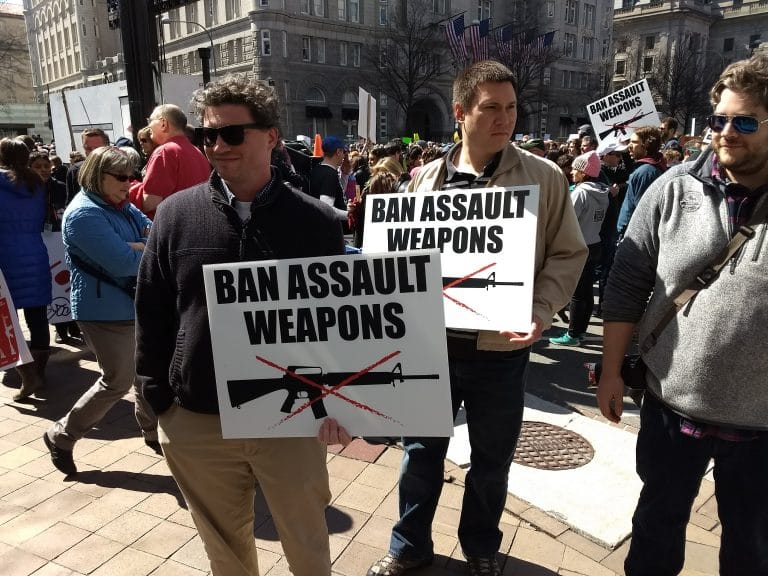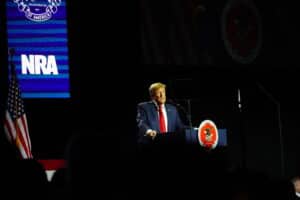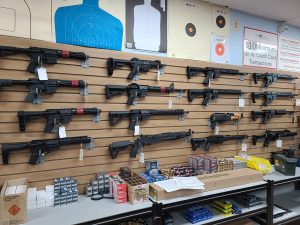San Jose Mayor Sam Liccardo (D.) doubling down on his city’s unprecedented gun-control ordinances this week was notable for more than just his ringing endorsement of gun confiscation. His comments on local action were a bellwether for what’s likely to be the future arena for gun policy.
“Congress has completely abdicated its responsibility over this entire area,” Liccardo said in an L.A. Times podcast appearance on Monday. “Inevitably you’re going to see mayors and local officials stepping up to say, ‘Look if you guys aren’t going to do something to protect my residents, I’m [going to].’ I’ve got a lot of other mayors throughout the country that email me and call me saying ‘Tell me how it goes we want to jump in.’”
The city’s ambitious pursuit of these novel gun-control measures, along with other recent developments across the country, make it clear: The future of gun policy is localism.
As the mayor pointed out, not much has happened at the federal level—for gun rights or for gun control. The House passed a universal background check bill back in March, but with such a slim majority for Democrats in the Senate, its prospects of becoming law are essentially zero. Additionally, Biden’s controversial ATF nominee, who was tapped specifically to spearhead his gun control agenda at the federal level, continues to face an uncertain future due to fierce resistance and mounting controversies.
Instead, states and municipalities have taken it upon themselves to craft gun policy. Two court decisions covered by The Reload last week showcased disputes over local firearm restrictions.
In Hawaii, the city of Honolulu was denying firearm purchasing permits to individuals convicted of non-criminal violations, such as disorderly conduct. Ten days after a lawsuit was filed against this practice, the city quickly agreed to discontinue denying purchase permits on non-criminal grounds, negating the need for a judicial decision on the matter.
In Pennsylvania, the Third Circuit Court of Appeals reversed a lower-court decision on a lawsuit challenging the zoning restrictions of a suburban township. The lawsuit, filed on behalf of a Pittsburgh-area gun club, seeks to challenge zoning laws that prohibit the use of centerfire rifles and mandate non-profit status for gun clubs in the region. The restrictions will almost certainly be struck down upon review by the district court following the thorough directions of the Third Circuit.
In these examples, the courts intervened to stymie local firearms restrictions. But gun-rights proponents should not count on the courts to always intervene successfully.
In another Pennsylvania example, the city of Philadelphia notably shut down carry-permit applications at the onset of the pandemic—and kept them shut down until pressure from multiple lawsuits forced the city to reopen the process. However, the city then proceeded to delay processing the applications it received, in direct violation of state law. They have subsequently been sued again.
In other instances, states and localities have passed laws specifically to avoid judicial intervention into matters of local gun regulation.
This past June, the legislature in my home state of Colorado repealed our preemption law, which prohibited localities from passing gun control measures more severe than state law. In doing so, it became one of only of six states without such a law and the first state to ever repeal one. The language of the repeal grants local governments the ability to pass any firearm restriction, including a complete ban on licensed carry, provided it is not less restrictive than state law.
Jefferson County, located just west of Denver and the fourth-most populous county in the state, quickly sought to take advantage of the repeal by proposing a ban on licensed concealed carry within certain facilities and outdoor spaces under the county’s jurisdiction. Local officials eventually backed down in the face of public outcry.
The City of Boulder, where a tragic shooting created the impetus for the preemption repeal, is expected to have its municipal ban on assault weapons and high-capacity magazines reinstated and enforced. The city originally passed these bans in 2018 but saw them struck down by a Colorado judge for violating the state’s preemption law.
But it is not just pushes for gun control that are taking place at the local level. Gun-rights proponents have also sought to advance gun policy through local government. Roughly 1,137 counties across the country have passed resolutions declaring themselves “Second Amendment sanctuaries” according to reporting from The Center Square. The resolutions, while largely symbolic, demonstrate the desire among pro-gun localities to exercise autonomy over gun regulation as well.
As legislation involving gun policy seems to have hit a stalemate at the federal level, look for localities to become increasingly ambitious in testing what they can do unilaterally. As is increasingly the case with disputes over gun regulation, much that comes from this increased localization of gun policy will likely be left to the courts to sort out.






